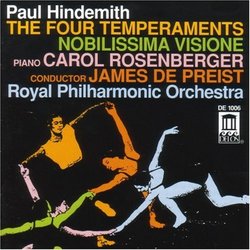Album DescriptionThe 1976 revival of the Four Temperaments by the New York City ballet sparked the present interest in this intriguing work, which was first produced by Balanchine thirty years before. Hindemith, who had written the piece as a ballet, had waited six years for the production, for the work was completed in 1940, just after the composer had settled in the United States. Hindemith's warm and witty musical treatment of the four personality types stands alone as music, and indeed is often performed in concert versions as a piano concerto. The idea of dominant character traits associated with one of the four "humours" or body fluids (black bile, blood, phlegm, and yellow bile) originated in ancient Greece and was widely accepted through the Middle Ages. It formed, in fact, the basis of subsequent psychological personality theory.The theme, and each of its four variations, has three distinct sections, as if to show three different aspects of a personality, thus giving a portrait of some dimension. The lyrical statement at the beginning of the Theme, with its full string sound, sets the tone for the entire work: the essential dignity of man, no matter what his temperament. The virtuoso entrance of the piano marks the second section: quicker paced, full of vivacity, the more ebullient side of any personality. The siciliano third section of the theme is stated first by a solo quartet - tender, perhaps the vulnerable side of man...Nobilissima Visione predates The Four Temperaments by two years. Massine, who produced the ballet in London in 1938 with the Monte Carlo Ballet, tells the story of the work's inception:"The idea of Nobilissima Visione was suggested to me by Paul Hindemith, whom I met unexpectedly in Florence. He had just come from the great church of Santa Croce, which contains the Giotto frescoes with scenes of St. Francis of Assisi. He was deeply impressed by them, and taking me by the arm, hurried me to the church so that I could see them also. I, too, was struck with their spiritual beauty, and could well imagine why they had moved Hindemith so deeply . . . He suggested that we create a ballet about the life of the saint . . . After we had picked out the episodes that seemed most appropriate for our purposes, we discussed each one in detail. I described to him how I saw the scenes, and improvised the choreography, so that Hindemith could visualize it better. In his precise way, he wanted to make detailed notes and afterwards to play through a succession of liturgical music on the piano, since he had decided to base his score mainly on early French church music, especially of the great 14th Century composer Guillaume de Machault . . . Nobilissima Visione was actually not a ballet at all. It was a dramatic and choreographic depiction of the life of St. Francis, in which Hindemith . . . and I attempted, throughout to create and preserve an atmosphere of mystical exaltation."

